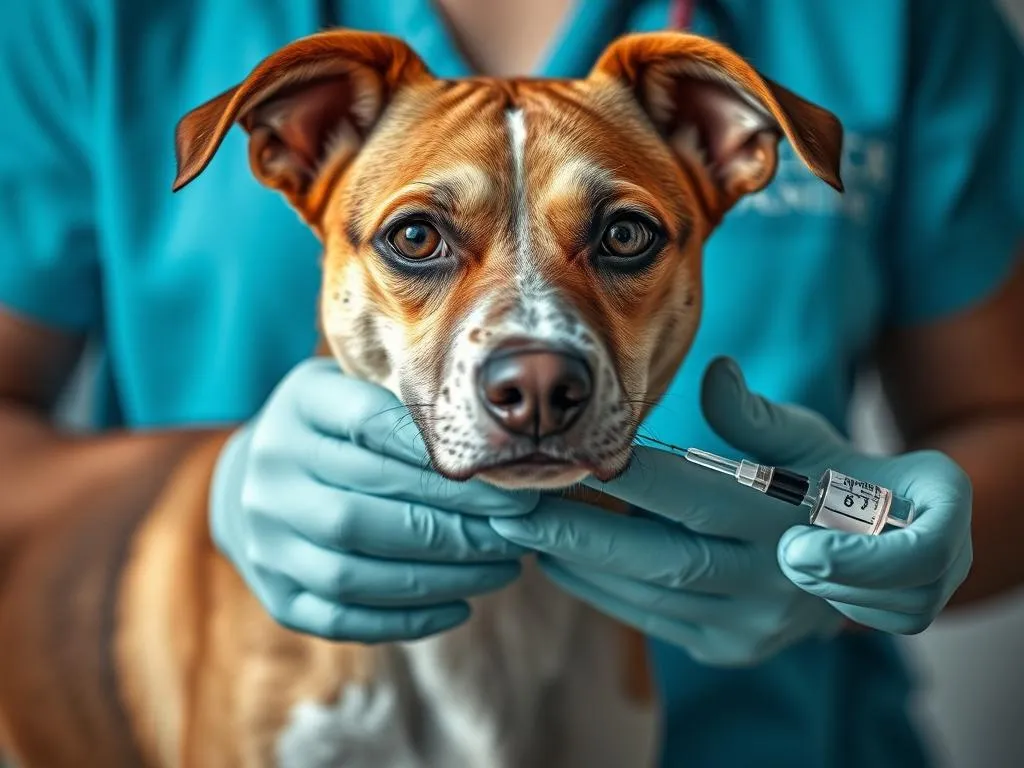
Introduction
Vaccinations play a crucial role in maintaining your dog’s health and preventing the spread of infectious diseases. As responsible pet owners, understanding which dog vaccines are absolutely necessary is essential for ensuring your furry friend remains healthy and protected. This article aims to clarify the essential vaccines your dog needs while emphasizing the importance of consulting with a veterinarian for personalized advice tailored to your dog’s specific needs.
In the following sections, we will explore the world of dog vaccines, distinguishing between core and non-core vaccinations, and outlining the vaccination schedule. By the end, you will have a comprehensive understanding of dog vaccinations, enabling you to make informed decisions for your pet’s health.
Understanding Dog Vaccines
What Are Dog Vaccines?
Dog vaccines are biological preparations that provide immunity against specific diseases. They work by stimulating the dog’s immune system to recognize and fight off pathogens, such as viruses and bacteria, without causing the disease itself. When a dog receives a vaccine, their body produces antibodies, which prepare the immune system to respond effectively if exposed to the disease in the future.
Types of Dog Vaccines
Vaccines can be categorized into two main types: core and non-core vaccines. Additionally, they can be classified based on their composition, including inactivated vaccines (made from killed pathogens) and modified live vaccines (made from weakened pathogens). Understanding these categories is vital in determining which vaccines are necessary for your dog.
Core Vaccines for Dogs
What Are Core Vaccines?
Core vaccines are those that are universally recommended for all dogs, regardless of their lifestyle or geographic location. The American Animal Hospital Association (AAHA) has established guidelines for core vaccinations, emphasizing their critical importance in protecting dogs from severe and potentially fatal diseases.
List of Core Vaccines
- Rabies
-
Rabies is a viral disease that affects the central nervous system and is almost always fatal. It is also a zoonotic disease, meaning it can be transmitted to humans. Vaccination against rabies is not only essential for your dog’s health but is often required by law in many areas.
-
Canine Parvovirus
-
Canine parvovirus is a highly contagious and severe viral infection that primarily affects puppies and unvaccinated dogs. It can cause severe gastrointestinal issues, including vomiting and diarrhea. Vaccination is crucial, with the first dose typically administered at 6 to 8 weeks of age, followed by a series of boosters.
-
Canine Distemper
-
Canine distemper is a viral disease that affects a dog’s respiratory, gastrointestinal, and nervous systems. Symptoms may include fever, coughing, and seizures. Vaccination is vital, with initial vaccinations recommended for puppies starting at 6 to 8 weeks of age.
-
Canine Adenovirus (CAV-2)
- CAV-2 is responsible for infectious canine hepatitis and can cause respiratory illness. Vaccination is recommended as part of the combination vaccine that protects against multiple diseases. The initial vaccination is typically given to puppies at 6 to 8 weeks of age.
Benefits of Core Vaccinations
Core vaccinations provide significant benefits, including:
- Protection against severe diseases that can lead to hospitalization or death.
- Contribution to herd immunity, which helps prevent the spread of diseases within dog populations.
Non-Core Vaccines for Dogs
What Are Non-Core Vaccines?
Non-core vaccines are those that are not essential for every dog but may be recommended based on individual risk factors. These factors include a dog’s lifestyle, health status, and geographical location. Understanding the role of non-core vaccines can help pet owners make informed decisions about their dog’s health.
List of Non-Core Vaccines
- Bordetella Bronchiseptica (Kennel Cough)
-
Kennel cough is a highly contagious respiratory disease commonly seen in dogs that are frequently in close quarters with other dogs, such as in kennels or dog parks. Vaccination is recommended for dogs at risk of exposure, especially puppies and those in communal settings.
-
Lyme Disease
-
Lyme disease is transmitted by ticks and can lead to serious health issues, including joint pain and kidney disease. Vaccination is recommended for dogs living in areas where Lyme disease is prevalent. Consult your veterinarian for guidance based on your location.
-
Leptospirosis
-
Leptospirosis is a bacterial infection that can affect both dogs and humans. It is transmitted through contaminated water or soil. Vaccination is essential for dogs at higher risk, particularly those exposed to wildlife or living in areas with standing water.
-
Canine Influenza
- Canine influenza is a contagious respiratory disease caused by specific strains of the influenza virus. Vaccination is recommended for dogs that are frequently in contact with others, such as in boarding facilities or dog parks.
Weighing the Risks and Benefits of Non-Core Vaccines
When considering non-core vaccines, it’s essential to assess your dog’s individual factors, including age, health, and lifestyle. Understanding the regional prevalence of diseases can help you and your veterinarian make informed decisions about necessary vaccinations.
The Vaccination Schedule
Puppy Vaccination Schedule
The vaccination schedule for puppies typically starts at 6 to 8 weeks of age, with core vaccinations given in a series every 3 to 4 weeks until they are around 16 weeks old. Commonly administered vaccines during this period include rabies, parvovirus, distemper, and adenovirus. It’s crucial to follow up with booster shots as recommended by your veterinarian to ensure lasting immunity.
Adult Dog Vaccination Schedule
For adult dogs, the vaccination schedule will depend on the core vaccines received as puppies. Generally, core vaccines need to be boosted every 1 to 3 years, depending on the specific vaccine and the veterinarian’s recommendations. Annual check-ups are vital to assess your dog’s health and determine the need for any vaccines.
Factors Affecting Vaccination Schedules
Several factors can influence vaccination schedules, such as:
- Age: Puppies require more frequent vaccinations as their immune systems develop.
- Health Status: Dogs with underlying health conditions may have different vaccination needs.
- Lifestyle: Dogs that spend time in communal areas or have exposure to wildlife may require additional vaccinations.
Common Myths and Misconceptions
Debunking Vaccination Myths
There are many misconceptions surrounding dog vaccines. Some pet owners fear that vaccines can overwhelm a dog’s immune system or cause harmful side effects. However, vaccines are rigorously tested for safety and efficacy. The benefits of vaccination far outweigh the risks, and adverse reactions are rare.
The Importance of Staying Informed
Staying informed about vaccines is essential for dog owners. It’s crucial to seek information from reliable sources and consult with your veterinarian to ensure your dog receives the appropriate vaccinations based on their individual circumstances.
FAQs About Dog Vaccinations
Common Questions
-
How do I know if my dog needs a vaccine?
Consult your veterinarian for a thorough evaluation of your dog’s health, lifestyle, and vaccination history. -
What are the side effects of dog vaccines?
Side effects are generally mild and may include soreness at the injection site, mild fatigue, or a slight fever. Serious side effects are rare. -
Can my dog have an adverse reaction to vaccines?
While adverse reactions can occur, they are uncommon. Monitoring your dog after vaccination can help identify any potential issues early.
When to Consult Your Veterinarian
Regular vet visits are crucial for maintaining your dog’s health. If you notice any unusual symptoms after vaccination or if your dog’s lifestyle changes, it’s important to consult with your veterinarian to discuss vaccination needs.
Conclusion
In conclusion, understanding which dog vaccines are absolutely necessary is vital for your pet’s health and well-being. Core vaccines provide essential protection against severe diseases, while non-core vaccines can be tailored to your dog’s individual needs based on lifestyle and risk factors. Following a tailored vaccination schedule and seeking veterinary guidance will ensure your dog remains healthy and protected throughout their life. Prioritize your dog’s health by staying informed and consulting with your veterinarian regularly.









